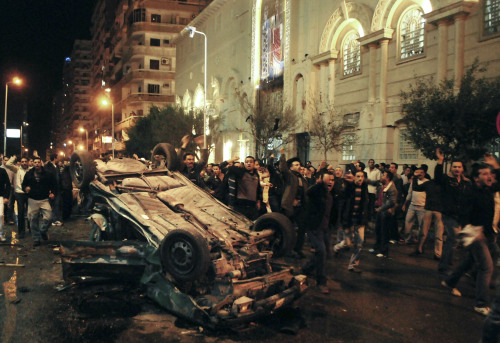Christians clash with police; interior minister blames 'foreign elements'
ALEXANDRIA, Egypt (AFP) ― Egypt said a suicide bomber killed 21 people and wounded 79 outside a Coptic church on Saturday, in an attack President Hosni Mubarak said was the work of “foreign hands.”
There was no immediate claim but al-Qaida has called for punishment of Egypt’s Copts over claims that two priests’ wives they say had converted to Islam were being held by the Church against their will.
The bombing in the Mediterranean port city of Alexandria sparked anger among Christians, who clashed with police and shouted slogans against the regime of the ageing president, as well as condemnation from Western governments.
A health ministry official said 21 people were killed and 79 wounded, and the interior ministry said eight of those hurt were Muslims.
 |
Worshippers shout around an exploded car in front of a Coptic Christian church in the Egyptian city of Alexandria. (AP-Yonhap News) |
A witness had told private channel On-TV that in a car park outside the Al-Qiddissin (The Saints) church shortly after midnight, he saw two men get out and the explosion happen almost immediately afterwards.
But the interior ministry ruled out the hypothesis of a car bomb, saying it was “probable that the bomb... was carried by a suicide bomber who died among the crowd.”
The device was packed with pieces of metal to cause the maximum harm, the ministry added.
And the circumstances of the explosion, “given the methods that currently prevail in terrorist activities at the global and regional level, clearly indicate” that the bombing was “planned and carried out by foreign elements.”
Mubarak echoed that, saying the bombing bore the hallmark “of foreign hands.”
In televised remarks, he referred to it as something that “is alien to us,” and pledged to “cut off the head of the snake, confront terrorism and defeat it.”
Egypt has been the target of repeated attacks against foreign tourists in recent years, most notably bombings on resorts in the south Sinai and a hostage bloodbath in Luxor in 1997 that killed more than 60 holidaymakers.
Pope Benedict XVI urged world leaders to defend Christians against abuse and intolerance, while U.S. President Barack Obama denounced an “outrageous” bombing.
“I once again launch a pressing appeal not to give in to discouragement and resignation,” said the pontiff.
“The perpetrators of this attack were clearly targeting Christian worshippers, and have no respect for human life and dignity. They must be brought to justice for this barbaric and heinous act,” Obama said.
The European Union “unreservedly” condemned the bombing. “There cannot be any justification for this attack,” the EU’s foreign affairs chief Catherine Ashton said.
Refaa al-Tahtawi, spokesman for Al-Azhar, Sunni Islam’s main seat of learning, appealed for calm, as did a senior Coptic official.
In the day after the bombing, growing numbers of Christians were continuing to vent their anger.
By mid-afternoon, hundreds of youths in small groups in the neighborhood of the church were showering rocks and bottles on police, who responded with tear gas and rubber-coated bullets.
“O Mubarak, the heart of the Copts is on fire,” they shouted as they darted in and out of side-streets to heckle police.
Others unfurled their fury at the “cowardly terrorists” and chanted: “The blood of the Copts is not cheap.”
One demonstrator brandished a large cross, with bloody remnants of victims’ clothing attached.
At least 5,000 people took part late Saturday in funerals for the victims at a monastery outside Alexandria, where crowds of mourners shouted slogans and refused to accept official condolences.
“No, no, no,” the crowd shouted as a Church official tried to read out condolences from Mubarak.
In Alexandria, the Church said in a statement that the attack “constituted a dangerous escalation in sectarian incidents against the Copts.”
While no one has claimed the attack, it comes two months after gunmen stormed a Baghdad cathedral in an operation that left 44 worshippers, two priests and seven security force personnel dead.
That was claimed by al-Qaida’s Iraq affiliate, the Islamic State of Iraq, which said its purpose was to force the release of the two women in Egypt.
“All Christian centers, organizations and institutions, leaders and followers, are legitimate targets for the mujahedeen (holy warriors) wherever they can reach them,” the group said.
“Let these idolaters, and at their forefront, the hallucinating tyrant of the Vatican, know that the killing sword will not be lifted from the necks of their followers until they declare their innocence from what the dog of the Egyptian Church is doing,” the ISI said.
After those threats, protection around Coptic places of worship was discreetly stepped up, with Mubarak saying he was committed to protecting the Christians “faced with the forces of terrorism and extremism.”
The Copts, who account for up to 10 percent of Egypt’s 80-million population and often complain of discrimination, have been the target of repeated sectarian attacks.








![[Today’s K-pop] Blackpink’s Jennie, Lisa invited to Coachella as solo acts](http://res.heraldm.com/phpwas/restmb_idxmake.php?idx=644&simg=/content/image/2024/11/21/20241121050099_0.jpg)